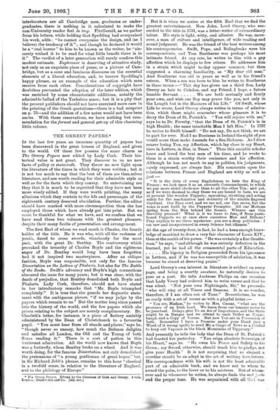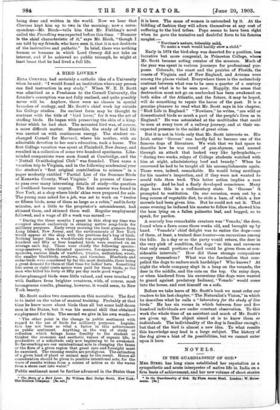THE ORRERY PAPERS.* IN the last few years an immense
quantity of papers has been discovered in the great houses of England, and given to the world. Of these few possess the same charm as The Orrery Papers now edited by Lady Cork. Their his- torical value is not great. They discover to us no new facts of policy or statecraft. They throw no new light upon the literature of the times in which they were written ; but it is not too much to say that the best of them are themselves literature, and era worth reading for their admirable style as well as for the facts which they convey. So entertaining are they that it is much to be regretted that they have not been more wisely edited. If they were worth printing, the many allusions which they contain to the life and personages of the eighteenth century deserved elucidation. Further, the editor should have marked with more circumspection than she has employed those which have already got into print. But we must be thankful for what we have, and we confess that we have read these two volumes with the greatest pleasure, despite their many faults of presentation and arrangement.
The first Earl of whom we read much is Charles, the fourth holder of the title. He it was who, with all the rashness of youth, dared to cross swords, vicariously for the most part, with the great Dr. Bentley. The controversy which provoked the temerity of Charles Boyle and the righteous anger of Dr. Bentley would long have been forgotten had it not inspired two masterpieces. After an oblique fashion, Boyle was responsible, not only for the famous Dissertation on the Letters of Phalaris, but also for The Battle of the Books. Swift's advocacy and Boyle's high connections obscured the issue for many years; but it was clear, with the death of prejudice, that Bentley demolished both Boyle and Phalaris. Lady Cork, therefore, should not have stated in her introductory remarks that "Mr. Boyle triumphed completely." It is true that she guards her dogmatic state- ment with the ambiguous phrase, "if we may judge by the papers which remain to us." But the matter long since passed into the history of the world, and the few papers which she prints relating to the subject are merely complimentary. Dr. Charlett's letter, for instance, is a piece of flattery amiably administered by the Dean of Christchurch to a favourite pupil. "You must hear from all stands and places," says he, "though never so uneasy, how much the Defence delights and satisfies all London, the Old and the Young of both Sexes reading it." There is a sort of pathos in this irrelevant admiration. All the world now knows that Boyle was a butterfly, whom Bentley broke on a wheel. And it was worth doing, for the famous Dissertation not only demolished the pretensions of "a young gentleman of great hopes," but, in Sir Richard Jebb's phrase, remains to this hour "classical in a twofold sense, in relation to the literature of England, and to the philology of Europe."
Ti.• Orrery Papers. Edited by the Countess of Cork sad Orrery. 2 vols.
London: Duckworth and Co. [42s. net.]
But it is when we arrive at the fifth Earl that we find the greatest entertainment. Now John, Lord Orrery, who suc- ceeded to the title in 1731, was a letter-writer of extraordinary talent. His style is light, witty, and allusive. He was, more- over, a man of culture and intelligence, of wide reading and sound judgment. He was the friend of the best writers among his contemporaries. Swift, Pope, and Bolingbroke were his correspondents, and Tom Southerne was perhaps his most intimate friend. At any rate, he writes to him with a. gay affection which he displays to few others. He addresses him in a strain which might to-day appear common, but then suggested a charming familiarity, as "My dear old man."
And Southerne was old in years as well as in his friend's esteem. When a son was born to him he writes to Southerne in these terms :—" This day has given me a third Son, Lady Orrery an heir to Caledon, and my Friend, I hope, a future humble Servant We are both mutually and firmly your own, and wish our Boy may prove like you, not only in the Length but in the Manners of his Life." Of Swift, whose Life he wrote, Lord Orrery always writes in terms of admira- tion, which those might remember whose pleasure it is to.
decry the Dean of St. Patrick's. "You will rejoice with me," says he to Dr. Ferreby, 'that the Dean of St. Patrick's is in high Health ; the same inimitable Man I left Him." In 1737 he writes to Swift himself : "Do not say, Do not think, we are to part for ever. Had I no Business in Ireland the sight of you would more than make Amends for a Sea Sickness. As I draw nearer losing You, my Affection, which lay close in my Heart, rises in Letters, in Size, in Tears." Thus this amiable scholar knew and loved the best men of his time, and he wrote to.. them in a strain worthy their eminence and his affection. Although he has not much to say in politics, his judgments, rarely expressed, are always fair. His comments upon the relations between France and England are witty as well as just :—
" It is the duty of every Englishman to hate the King of Prance: we look upon it as an eleventh Commandment, to which we pay more strict obedience than to all the other Ten : and yet, as if we were doomed to obey those we are bound to hate, we are at present like wooden Puppets; squeaking, strutting and acting solely for the machination and dexterity of the nimble fingered Cardinal. Our Eyes row), and we see not, our lips move, but the voice is sent forth by the Puppets' Prompter. All our Motions spring from the Man behind the Scenes. Whence can this Servility proceed? What is it we have to fear, if from paste- board Puppets we at once shew ourselves Men and Britons? Pray explain to me these mysteries : you are a deep politician : I am raw and inexperienced in every Science but idleness."
At the age of twenty-four, in fact, he had a keen enough know- ledge of mankind to draw a very fair character of Louis XIV., then at the zenith of his power. "He was certainly a fine Gentle- man," he says, "and although he was entirely defective in the
learned, yet he had all the ornamental parts of Education.
His bigotry in Religion proceeded from his ignorance
in Letters, and if he was too susceptible of adulation, it was because he aimed at deserving praise."
Lord Orrery's own interest in literature is evident on every page, and being a courtly amateur, he naturally desires to
pose as a poet He tells Ambrose Philips on one occasion that Lady Vesey had ordered him to write verses and that he was silent. "Not your own Nightingale, Sir," he proceeds. "who will sing at all Times and Seasons. It is no wonder, therefore, if I am often out of Tune." Nevertheless, he was as ready with a set of verses as with a playful letter :—
" You see, Madam," be writes to Mrs. Caesar, "what are the promises of an Irish Lord. We learn from our tenants never to be`punctual. Delays give Us an Air of Importance, and the State might be in Danger and we attend to such Trifles as 1Jsque- baugh and a Copy of Verses. But now You are in Possession of both. Remember I have a Promise under your Hand (not a Word of it wrong spelt) to send Me a Cargo of News as a Cordial to keep out Vapours in the black Mountains of Tipperary."
And presently he tells the lady that the Dean of St. Patrick's had toasted her yesterday. "You reign absolute Sovereign of his Heart," says he. "He owes his Peace and Safety to his Gown ; my Sword, otherwise, should teach him to pledge, not give your Health." It is not surprising that so elegant a courtier should be an adept in the art of writing love-letters.
His correspondence with his wife is not the least admirable part of an admirable book, and we know not to whom to award the palm, to the lover or to his mistress. But of whom- ever and to whomever he writes, he always finds the »tot j aide and the proper tone. He was acquainted with all t1144.: being done and written in the world. Now we hear that Clarissa kept him up to two in the morning; now a corre- spondent—Mr. Birch—tells him that Mr. Fielding's novel called the Foundling was expected before this time. "Humour is the chief characteristic of it," says Mr. Birch, " though I am told by my friends, who have seen it, that it is not destitute of the instructive and pathetic." In brief, there was nothing human or humane in which Lord Orrery did not take an interest, and if he achieved no public triumph, he might at least boast that he had lived a full life.











































 Previous page
Previous page